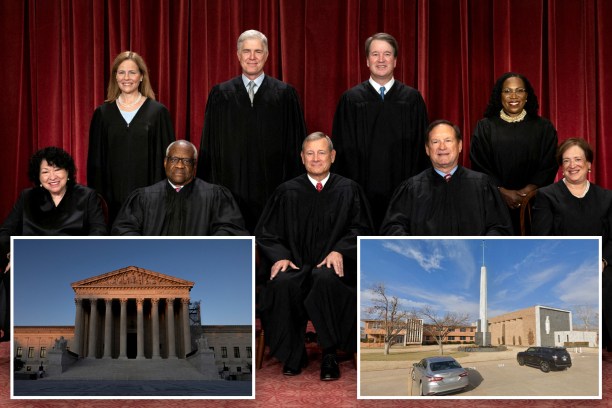Supreme Court Rejects Publicly Funded Religious Charter School In Rare Deadlock; Supreme Court Upholds Oklahoma Decision, In Blow to Religious Charter Schools: Oklahoma Catholic Virtual School Loses Bid for State Funding as Justices Deadlock 4-4 with Barrett Recusing
Supreme Court rejects publicly funded religious charter school in rare deadlock:
The Supreme Court deadlocked Thursday in a case that decided whether Oklahoma could provide funding to a religious charter school, the justices’ first tie vote on a major case in nearly a decade.
The 4-4 split meant the justices upheld the Oklahoma Supreme Court’s ruling that both Sooner State law and the US Constitution prohibit taxpayer funding from going toward religious schools.
Justice Amy Coney Barrett had recused herself from arguments, having taught at the University of Notre Dame’s law school for about 15 years. The school’s religious liberty clinic had been representing one of the parties in the case, St. Isidore of Seville Catholic Virtual School.
It is not clear which way each of the other eight justices voted on the case and the Supreme Court did not issue a written decision due to the split.
The deadlock also means prior court rulings that permitted taxpayer-funded voucher money to flow to religious schools but blocked public schools and charter schools from teaching religion will stand. Religious liberty advocates had been hoping the Supreme Court would reverse those prior rulings.
In June 2023, the five-member Oklahoma Statewide Virtual Charter School Board approved St. Isidore’s operation application in a 3–2 vote.
State Attorney General Gentner Drummond sued the Board in response, arguing the approval was illegal and fretting that the move would “open the floodgates and force taxpayers to fund all manner of religious indoctrination, including radical Islam or even the Church of Satan.”
The case sparked a split among top Oklahoma Republicans. Both the Trump administration and Oklahoma GOP Gov. Kevin Stitt had sided with the charter school board and St. Isidore’s, which filed a separate lawsuit against Drummond that was consolidated into oral arguments last month. The aspiring charter school is named after the Catholic patron saint of students. —>READ MORE HERE
Supreme Court upholds Oklahoma decision, in blow to religious charter schools:
Oklahoma Catholic virtual school loses bid for state funding as justices deadlock 4-4 with Barrett recusing
An evenly divided Supreme Court on Thursday ruled against a religious school that sought public funding from the state of Oklahoma.
In a 4-4 vote, the justices upheld the Oklahoma State Supreme Court’s decision that for St. Isidore of Seville Catholic Virtual School in Oklahoma City to receive public funds would be unconstitutional. Justice Amy Coney Barrett had recused herself from the case.
The court issued a one-sentence ruling upholding the lower court’s decision, saying only: “The judgment is affirmed by an equally divided Court.”
Oklahoma has argued that providing state funds for a religious charter school violates the First Amendment.
The Oklahoma Statewide Virtual Charter School Board approved St. Isidore’s contract request in June 2023, making them eligible to receive public funds. The school agreed that it would be free and open to all students “as a traditional public school,” and would comply with local, state and federal education laws.
But St. Isidore also indicated that the school “fully embraces the teachings” of the Catholic Church and participates “in the evangelizing mission of the church.”
Its ability to receive state funding was later blocked by the Oklahoma Supreme Court, which ruled that using the funds for a religious school was in violation of the Establishment Clause of the First Amendment.
Oklahoma Attorney General Gentner Drummond sued to block the approval of the school’s state charter, calling it an “unlawful sponsorship” of a sectarian institution, and “a serious threat to the religious liberty of all four-million Oklahomans.”
That argument was appealed to the Supreme Court, which agreed to hear the case in October. —>READ MORE HERE






